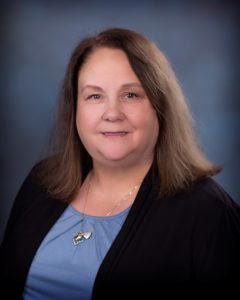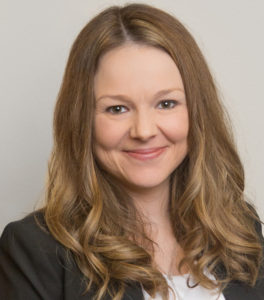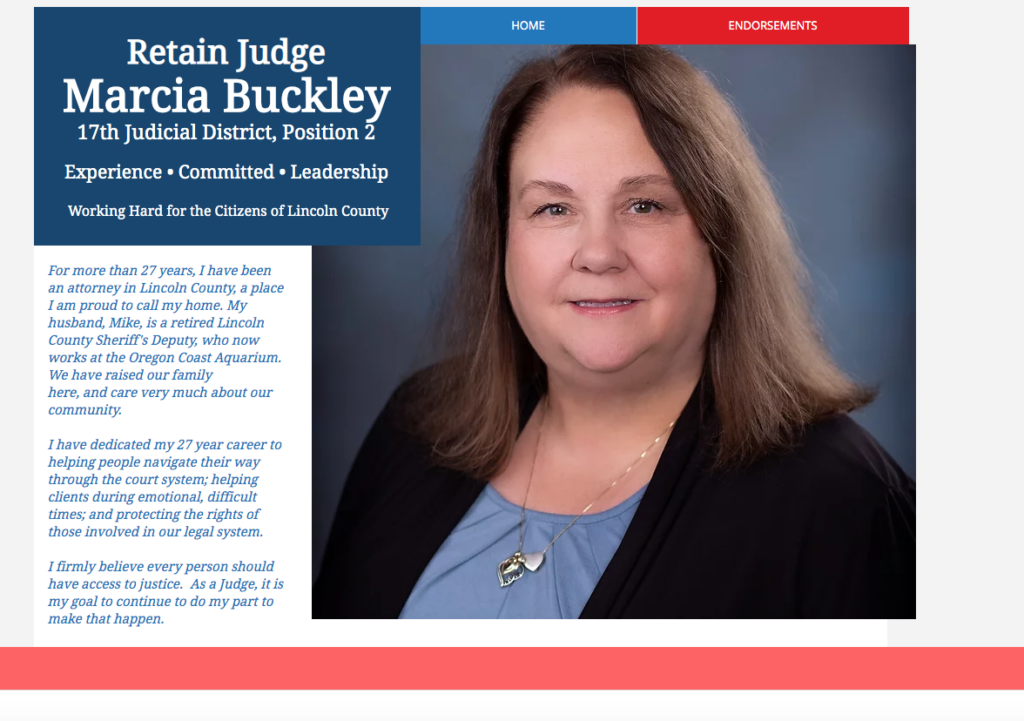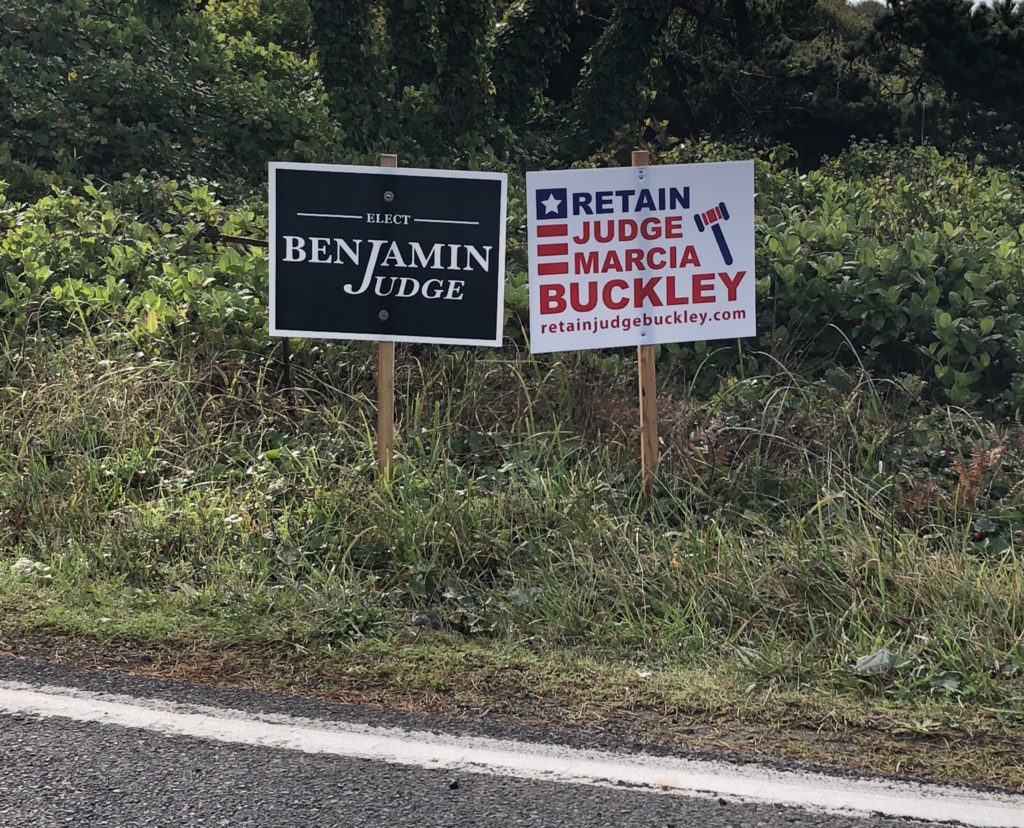

By QUINTON SMITH/YachatsNews.com
Another hotly-contested campaign involving Lincoln County’s legal community is again roiling the county courthouse in a general election race between an experienced lawyer appointed to a top position by the governor and a younger, aggressive opponent who was passed over for the job.
Think it’s a re-run of the race in May for Lincoln County District Attorney?
No. This time it’s to be a circuit court judge earning $147,000 a year.

Gov. Kate Brown appointed Marcia Buckley, a Newport lawyer and former deputy district attorney, as Lincoln County’s third circuit judge in January after Paulette Sanders officially retired.
Challenging her in the Nov. 3 general election is Amanda Benjamin, who is on her second, one-year Oregon Judicial Department contract in Lincoln County as a circuit judge pro-tem. She was among three others passed over for the governor’s appointment.
The race is also unusual because two other judges are publicly taking sides – which is not prohibited in Oregon’s judicial code of conduct. But it is also not typical, especially in a small courthouse where three to four judges have to try to work together.
Presiding Judge Thomas Branford and Judge Sheryl Bachart are appearing in advertisements for Benjamin, writing letters and contributing money to her campaign. Branford has contributed $300 as of Oct. 15, according to filings with the Oregon Secretary of State’s Office. Bachart contributed much more — $1,367.
Lanee Danforth, who won an acrimonious primary race for the district attorney’s office in May and will take office in January, contributed $285 to Benjamin.
Benjamin’s campaign has involved newspaper and social media advertising and is largely self-funded. As of Oct. 15, she has reported $29,777 in contributions, including $20,400 from her husband, Joseph Allison, an attorney. She has spent $22,512, leaving a cash balance as of Oct. 15 of $7,264. But Benjamin has loans and bills totaling $15,435, creating a campaign deficit of $8,170, according to the Secretary of State.
Buckley is spending on social media, advertising and yard signs and has received $5,713 in contributions as of Oct. 15, according to the state filings. She has spent $1,914, leaving her with a cash balance of $3,799. Personal expenditures total $13,215, creating a campaign deficit of $9,415, according to the Secretary of State.
Whomever wins Nov. 3 will serve a six-year term starting in January.
But a similar situation could be repeated again next year when Branford reaches the state’s mandatory retirement age of 75 for judges and the governor will appoint a replacement – who would then have to stand for election.
Both well-regarded in community
Despite the back-and-forth on social media and newspaper opinion pages, both Buckley and Benjamin are well-regarded for their legal work.
Buckley received her law degree from Lewis and Clark College in Portland in 1991, worked in the early 1990s in the Lincoln County District Attorney’s office, spent 12 years practicing on her own, then returned for a 4-year stint in the DA’s office before leaving in 2013 to again go into private practice, specializing in domestic relations.
She has a long history of involvement in Newport-area civic organizations, is president of the Lincoln County Bar Association, and is on the disciplinary committee of the Oregon State Bar.
Benjamin received her law degree from the University of Tennessee in 2012 then joined law firms in Medford and Newport before joining the Lincoln County DA’s office in 2015. She worked in it until October 2018, before being hired by Branford on contract as a temporary judge in January 2019. As a pro tem judge she created the mental health and wellness court.
Judicial candidates are prohibited from saying how they would vote on specific issues or cases. YachatsNews asked both candidates a series of questions about them, their work and their experiences. What follows are their answers.

Question: What attracted you to a legal career, first as an attorney and then as a judge?
Marcia Buckley:
My undergraduate work resulted in a double major in economics, and business and administrative studies. Following college, I worked in bank liquidation accounting, and then financial data analysis. It didn’t take long for me to realize that I wanted to interact more with people.
My childhood dream had been to become a lawyer, and I embarked on the long journey of attending law school at night, while continuing to work full-time during the day to support myself and pay for law school. It was an exhausting journey, and I have never regretted it.
After 27 years of practicing law in Lincoln County, an unexpected opening arose following a judge’s retirement. I had always felt that serving as a judge would be how I would want to spend the last part of my career. With the support of my husband and family, my decision was easy: I wanted to become a judge, applied to be appointed as a judge, and after an extensive background and vetting process, was appointed by Gov. Kate Brown in January.
I firmly believe every person should have access to justice. As a judge, it has been my goal to do my part to make that happen each day I sit on the bench.
Amanda Benjamin:
While I knew I wanted to be in a helping profession, I never considered the legal field profession until several years into college. My mother was a police detective who handled cases of sexual violence and child sexual abuse. One day I went to observe her testify in a jury trial and I found myself fascinated by the process. I realized that being an attorney was a powerful way to use my voice and particular skill set for others.
What attracted me to the role of a judge was having the ability to simply do what is just and appropriate in each and every situation. As an attorney, your role is to be an advocate for one side of a legal case or argument, so there may be times when your duty to advocate for your client is at odds with what you may believe is just or appropriate in a particular case. I enjoy the responsibility of determining how to correctly apply the law to cases in an unbiased manner rather than advocating only for a single side of an argument.
I chose the legal profession because it was my desire to be a public servant. I wanted a profession that would enable me to make positive changes in peoples’ lives.
Serving as a judge is the greatest way to put my legal skills, dedication to public service and work ethic to use for our community. I have seen the difference in case outcomes when a judge is disengaged or unprepared for a hearing compared to when a judge is invested and conscientious in their rulings.
Judges have a great amount of power to change the direction of a person’s life, to safeguard the community, to protect the rights of individuals and to implement change. I truly believe that I can benefit my community by serving in this role.
Question: Describe the general character of your work as a lawyer and judge. As a lawyer, indicate what kind of law you practiced. As a judge, indicate the nature of the cases over which you preside, any specialty courts or court programs, and any legal areas in which you concentrate.
Benjamin: In private practice my primary concentration was domestic relations cases. When I worked as a deputy district attorney, I prosecuted all types of cases including domestic violence, DUII, drug and property crimes. After approximately one year I transitioned into prosecuting almost solely child physical and sexual abuse cases, which were often Measure 11 cases. I was also the lead of the juvenile dependency team and handled juvenile delinquency sexual offenses.
I have been a pro tem judge for Lincoln County since January 2019. I have handled all types of cases since being on the bench in Lincoln County including criminal hearings and jury trials, domestic relations, civil, small claims, landlord/tenant matters, restraining and stalking orders, guardianship and conservatorships, and mental health commitment proceedings.
I am responsible for nearly all the juvenile delinquency and dependency cases for Lincoln County as well as a full criminal docket. I began working to establish a mental health treatment court in the fall of 2019 and I established the mental health and wellness court, the first mental health court in Lincoln County that follows Oregon Specialty Court Standards.
Buckley: Before becoming a judge, I practiced law in Lincoln County for 27 years, as a prosecutor for almost a decade, and as a civil attorney representing people in the most serious of their personal and business affairs.
Each day, I protected the community, children, families, and our most vulnerable population by keeping it safe. I was the Lincoln County chief deputy district Attorney. I have 12 years’ experience as an arbitrator and 14 years’ experience as a mediator. I specialized in family law, and have a proven track record working with families, children, veterans in crisis, addicts, and those struggling with mental illness. As the chief deputy district attorney, I worked to establish the county’s first mental health court, as well as a developmental disabilities court.
I also chaired the elder abuse team, disabilities abuse team, and sexual assault response team, protecting our vulnerable population.
As a judge, I have been assigned the civil docket. I am currently presiding over civil cases that include domestic relations cases (dissolution of marriage, child custody, parenting time, child support, spousal support, and modifications of prior family law judgments), Family Abuse Prevention Act restraining orders, Elderly Persons and Persons with Disabilities Abuse Prevention Act restraining orders, stalking orders, guardianships, conservatorships, and civil lawsuits of all sorts.

Question: Briefly describe your philosophy of the judicial role, the qualities that are most important for the role, and the greatest challenges to the role.
Buckley: My philosophy of the judicial role is that I believe everyone should have access to justice, and is entitled to a fair, neutral, compassionate and experienced judge to hear their cases. I believe the most important qualities for the judicial role are wisdom, compassion, and a sense of fairness.
Wisdom is born of experience. I was appointed as a circuit judge because I had 27 years of experience serving this community, both as a prosecutor and as a civil attorney.
Compassion is learned from service and struggle. I have served and protected this community and helped people in their most difficult decisions. A sense of fairness is developed through helping people find just results. As a judge, mediator and arbitrator, I have demonstrated my sense of fairness. Each day, I bring my broad base of legal knowledge to the bench.
I am a good listener and communicator. I treat every party fairly, with respect and dignity. Many of my cases involve people representing themselves. I am patient, answer questions, and work hard to resolve cases quickly and efficiently.
Before becoming a judge, I served on the Oregon State Bar’s Disciplinary Board, helping with the attorney discipline process. It is important for a judge to have extensive knowledge of attorney conduct rules.
The greatest challenges I have faced as a judge involve cases where the litigants represent themselves, and do not always understand how court procedures work. In my courtroom, litigants are provided with information in advance of trial regarding court procedures and how to submit evidence.
As a judge, I make sure that the parties not only appear before a neutral, unbiased judge — but that they also know they are free to ask questions of the court regarding courtroom procedures.
Good communication skills and an even temperament are two of the most important qualities a judge can have.
Benjamin: I believe the effectiveness of our courts relies on the quality of the judges and the amount of respect the community has for them. The community must feel that that they can take their legal matters to the court and receive a fair and just outcome. This begins by having judges that take the time to fully review and prepare for hearings, listen and respectfully address the litigants and victims, and explain their rulings and decisions to the parties.
Judges see people on a daily basis that are facing the worst or most difficult times in their lives; people that are in the midst of addiction, have been victimized, facing incarceration, getting divorced, fighting for custody of their children, losing financial security, etc. Hearings can be highly emotional and tense and the temperament of the judge is important in keeping the parties calm throughout the hearing and enabling them to leave the courthouse feeling that they were heard and respecting the decisions that were made.
In addition to having the appropriate temperament, judges must be dedicated to their own continual legal education. Regardless of the experience a judge has, it is important that they have the humility to listen and consider the arguments of counsel and fully review the law before making a decision.
There are times when attorneys or parties agree on a course of action that is not legally correct. A judge must be committed to researching the law or being up to date on the law that applies to every case that comes before them for a decision.

Question: The Lincoln County legal community, and number of judges, is small. How do you, or would you, deal with personality conflicts with attorneys who appear before you?
Benjamin: I’m proud of the fact that I have good working relationships with the attorneys who appear in front of me. Generally speaking, personality conflicts are less of a concern in the judicial role because most attorneys are respectful and professional.
When there are moments of conflict, I understand that because of the nature of the legal profession, people are under a lot of stress and they can get caught up in the moment. When tensions rise, I try not to take things personally.
Buckley: I have been a part of Lincoln County’s legal community for more than 27 years. I served as the president of the Lincoln County Bar Association in the mid-1990s, and have again served as president since 2017, having earned the respect of local attorneys.
Senior Circuit Court Judge Robert J. Huckleberry, who was Lincoln County’s presiding judge for many years, used to say, “You don’t have to be disagreeable to disagree.” I always took that to heart. As a lawyer, I have litigated cases against most of the attorneys in this county. You don’t always have to agree with each other, but you do have to be able to get along. I treat each attorney and litigant that comes before me with respect and dignity. Personality conflicts have no place in the courtroom.
Question: How would you propose dealing with the backlog of cases in Lincoln County courts due primarily to restrictions of the coronavirus pandemic?
Buckley: During the coronavirus pandemic, I have been conducting hearings by phone, when possible. The docket I have been assigned includes the domestic relations docket. Domestic relations cases are often extremely stressful for the parties involved as well as for their children. Those cases absolutely have to keep moving. I have done my best to do just that.
Lincoln County has had a very successful domestic relations mediation program for many years. Prior to becoming a judge, I served as a mediator in that program for more than 12 years. Recently, due to a shortage of family law mediators and coronavirus limitations, those domestic relations mediations stopped. I would like to see that program up and running again so that litigants have a chance to resolve their cases outside of the courtroom, quickly and efficiently, helping families and children eliminate the stress of ongoing litigation, and move forward with their lives. Historically, only new cases were given an opportunity to mediate through this program. I would like to see the program expanded to include older cases where new issues have arisen. The court costs of mediation are a fraction of the expenses incurred by the court associated with a trial. Even if parties are only able to resolve a portion of their issues through mediation, it would help free up valuable docket time.
Mediation would certainly help resolve some of the cases on the domestic relations docket.
Benjamin: We need to have people in this position who are innovative, who are problem solvers, and who can work well with staff and community partners to manage the backlog. This will have to be a united effort because the court cannot be effective without the cooperation of the District Attorney and defense attorneys and vice versa. I have proven to have a positive working relationship with all community partners and have proven my ability to work with them to implement new programs and ideas. My hope is that, as a group, our judges and attorneys can agree on creative solutions to manage the docket, but these shouldn’t be decided upon without input from each partner that will be impacted.
When the courts closed down due to COVID, I immediately began utilizing technology to hold remote hearings and because of this, our juvenile docket has seen very little delay due to COVID. My courtroom utilizes remote technology more frequently than any other in the county. I have made a point to solicit the opinions and ideas of community partners and attorneys throughout my time on the bench. I have been open to new ideas and I have made changes to improve the efficiency of the court.
Question: Briefly describe a case, or a legal issue on which you worked, of which you are particularly proud, or which is reflective of your legal ability, work ethic, judicial philosophy, or temperament.
Benjamin: It would not be appropriate to discuss any particular case, however, I have established general practices that I am proud of.
Generally speaking, I understand, and am always cognizant of, how my actions and treatment of a case impact the people before me and the community’s view of our justice system as a whole. I take the time to read through a case and prepare myself for issues that may arise before every single hearing, regardless of the type of case. I believe that every person that comes before the court deserves that attention and respect from the judge.
When I need to, I take time to contemplate the decisions I have to make in a case rather than ruling from the bench. This practice is avoided by many judges because it requires more work to write an opinion than to rule from the bench, however, I find that it allows me to give a case the consideration it deserves and it provides the parties with a clear written explanation of my decisions. While it does take more work, it is important for the court to fully consider the arguments of each party, be thorough in their review of the law and to fully explain the decisions that were made.
I work diligently to issue opinions in a timely manner because I know that the decisions I am making can greatly impact the lives of the litigants. I was recently affirmed by the court of appeals on a particularly difficult case and the court commented on the thoughtfulness and thoroughness of my written opinion.
I have an even temperament and a calm approach to the handling of hearings and trials. I speak to jurors after every trial and I take the most pride in the comments I have received from them. Jurors have felt, particularly after difficult or highly contentious trials, that the parties were treated fairly and respectfully, and the jurors have left the courthouse with a positive impression of our court system.
Buckley: For many years, I represented people in domestic relations cases, often working with veterans and some of their special issues. One of the cases I am most proud of involved representing a disabled veteran in a contested custody matter. My client came to me terrified that he would not be treated fairly because of his gender, and his disability. He did not have a lot of money, was sure he was going to lose his children, and was ready to give up.
I was able to help him see that he had a fair shot in our courts. Over the course of many months, we were able to work together, and ultimately, he was awarded custody of his children. Those children are now grown adults with their own children.
My judgment and experience allowed me to help this veteran navigate these issues, address his fear, and get a positive result for this family. That case was one of the first of many cases in which I represented a veteran. My knowledge of working closely with veterans and understanding of the issues veterans face is something unique that I bring to the bench.
Question: Briefly describe an issue, related to the local or Oregon justice system, that is of particular interest or concern to you, or that you have interest in working toward improving.
Buckley: I believe access to justice is one of the most important issues related to Oregon’s justice system. People need to be able to have the resources that will help them understand how the legal system works. Anybody can enter a courtroom, but those that do need to understand how the process works — from presenting a case to understanding what evidence is admissible to learning how to submit pleadings and exhibits. It is my goal to make the litigants that appear before me feel they have access to justice and an opportunity to be heard.
Benjamin: I have always been particularly interested in juvenile court. Juvenile cases are not always given the amount of attention that they deserve. The children who are placed in the juvenile court system through no fault of their own deserve to be made a priority. The way in which these children are treated by the courts can have an impact on the direction they take in their lives and their developing sense of self-worth. It is my goal to continually improve our juvenile court program and to reach a point when children are comfortable appearing in court, want to participate in their hearings and truly feel that they have community support.
Our county has more review hearings in juvenile dependency cases than many other counties and I believe it is important that the court continue to closely monitor the cases. Although state caseworkers are typically in their profession because they are dedicated to social work and care about children and families, they are greatly overworked and understaffed. Court oversight is important to ensure that a child or families’ needs are being met.
Finally, it is my goal to continue to build a strong juvenile court team in Lincoln County. I believe that utilizing the experience and ideas of all of our juvenile court participants will result in a highly efficient and successful program where we can come together to truly make children and families a priority.
Another interest of mine has been establishing a mental health treatment program in Lincoln County. This has been attempted in the past but has always lacked some key components that were needed to ensure success, such as involvement of community partners and community supervision of participants. It became very clear to me after taking the bench that our county needed a treatment court to help connect defendant’s involved in the criminal system as a result of their mental illnesses with appropriate services and support.
I began the county’s mental health and wellness court, a treatment court that complies with the Oregon Specialty Court Standards. It is my goal to strengthen existing community partnerships, build new community partnerships and to expand the services and assistance we can offer to our participants.
Question: Briefly describe a legal figure whom you admire and why.
Benjamin: Ruth Bader Ginsburg. Not only because of her work to establish gender equality but also because of her character and the way she led her personal life. In her early career, Ginsberg managed to excel in a field that did not welcome women while raising a family and caring for her husband through cancer. She conquered cancer four times herself and was able to serve in one of the most important roles in our country until age 87.
In a professional capacity, I admire the way that Ginsberg handled conflict or disagreements. She was able to work with, respect and have friendships with individuals with vastly different viewpoints than her own. She was able to present her positions on divisive issues in a way that helped people understand and consider her viewpoint without being confrontational.
Buckley: Do I only get one legal figure? First, I must voice my admiration for Ruth Bader Ginsberg, a true pioneer for women in the field of law. Her fairness, intelligence, and love of people are all traits for which I have great respect.
Second, I must voice my admiration for Senior Circuit Court Judge Robert J. Huckleberry. Judge Huckleberry served Lincoln County for many years. His intelligence, willingness to listen, patience, and temperament are traits to be respected and admired.
Question: What differentiates you from your opponent in the Nov. 3 election?
Buckley: I am the most experienced candidate in the race. I am the only candidate who has almost 30 years of legal experience and community service in Lincoln County. I have been a member of the Oregon State Bar for 28 years, 27 of which I was a trial attorney.
Over the course of the year, I have enjoyed my work as a circuit judge.
I am proud to call Lincoln County my home. My husband and I raised our family here, and I care very much about my community. I am the only candidate with long-term, continuous ties to this community.
I believe experience matters. I have represented clients and families with compassion, knowledge and respect. I have fought for justice for children, disabled and elderly residents, and businesses. I have a proven track record of working with addicts, those who struggle with mental illness, and veterans. I genuinely care about the people in my community, and want to continue serving them as their circuit court judge.
As a judge, I will continue to serve this community through my volunteer work that does not create a conflict of interest.
I am endorsed by judges, public officials, attorneys, community leaders, and people who have worked with me. I am proud that my supporters include people from different backgrounds, and all parts of Lincoln County. The outpouring of support has been humbling.
I have the right experience, the right record, and I ask to continue as your Circuit Court Judge.
Benjamin: I have more experience on the bench than my opponent, 22 months at the time of the election. I’ve handled a wider variety of cases while on the bench and am more familiar with criminal and juvenile law and managing those caseloads. I am more capable of handling criminal jury trials as I have the most recent criminal practice and have presided over many trials.
My opponent hasn’t practiced criminal law in some time, has handled only civil matters in her eight months on the bench and has only tried 20 criminal jury trials in her 27-year career.
While my opponent frequently mentions that I have been an attorney for fewer years than she has, the voters should look at more than the length of time each of us has been an attorney. I rose quickly as an attorney and rose quickly to the bench because my employers immediately recognized my talents and abilities.
Throughout this long process of campaigning, I have yet to hear anyone on either side attack or demean me as a judge or as an attorney. I am well-respected, hard working, meticulous and I treat everyone with respect. I have proven to take initiative to make changes and improvements where they are needed and began doing so as soon as I started the job. These are the qualities that make me a better candidate for the circuit court judge position.
Question: Please state any other information that you regard as pertinent to your candidacy.
Benjamin: Please feel free to contact people that work frequently in the court system such as social workers, law enforcement, court and legal staff and attorneys if you are unsure which candidate to vote for. You can also reach out to me. My contact information is on my webpage at BenjaminForJudge.com
Buckley: I believe experience matters. Not just legal experience, but life experience. I have dedicated my 28-year legal career to working with people, helping crime victims and clients during emotional, difficult times, and protecting the rights of those involved in our legal system. I am committed to this county, and am the only candidate to have lived here continuously for more than 27 years.
I want to remind the voters that the people who applied to be appointed as a judge went through a thorough background and vetting process by the Oregon State Police. This background process included a complete investigation into my history as an attorney as well as interviews with those who know me, references, judges, attorneys, people with whom I have worked, and even my neighbors.
After a lengthy, careful process, based on my experience and commitment to this community, the governor appointed me to be your circuit judge. I have the right experience, the right record, and ask for your vote to continue as your Lincoln County circuit judge.



